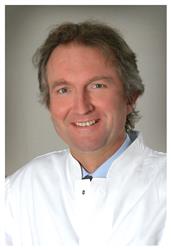PortfolioMartin Röcken
Personendaten

Kontaktdaten
Lebenslauf
Forschungsschwerpunkte
The Röcken laboratory explores primarily the role of adaptive immunity, especially of various T cell phenotypes in inflammation, infections and cancer diseases. For this, the lab especially analyzes basic mechanisms of T cell immunology, T cell differentiation, cancer biology and the interactions between the immune system and cancer.
Thus, the lab was the first to demonstrate that the different T helper cell phenotypes (TH1, TH2 …) differentiate from undetermined precursors (1992). Moreover, the lab showed for the first time in vitro and in vivo that T cell receptor-mediated signals determinate the specificity of the TH1 and TH2 cell differentiation, first in mice (1992, 1994, 2001), then in humans (2003). Importantly, this concept of T cell differentiation was then translated into novel therapeutic strategies for autoimmune and infectious diseases in mice (1994, 2001). Subsequently, these findings allowed to prove originally in mice that cytokines delivered by T helper cells determine the outcome of autoimmune diseases in mice (1994). From there, "cytokine-induced immune deviation" was further developed as translational therapy for human autoimmune diseases, namely psoriasis (first in man; 2003, 2011, 2013).
Based on the experience that the various T helper cell phenotypes determine the outcome of both, infections and autoimmune diseases, through the cytokines they release, the lab explored the role of T helper cells (pro-inflammatory TH1 cells) in the natural control of cancer development and cancer therapy.
It was among the first ones to show that interferon-producing CD4+ T cells can fight cancer. Based on this, the lab uncovered that T cell immune responses cannot only destroy cancer (2008) but induce cancer containment by inducing a permanent growth arrest.
Recently, the lab found that exogenous signals (cytokines from TH1 cells) can drive cancers into senescence. Thus, the immune system can efficiently arrest cancer by inducing a permanent growth arrest or senescence in cancer cells, even in the absence of cancer killing (2013).
Based on in depth in vivo experiments, the lab currently translates this T-helper-cell-based (cancer specific TH1 cells) treatment approach as therapy for patients with advanced melanomas and childhood cancer (first in man).

